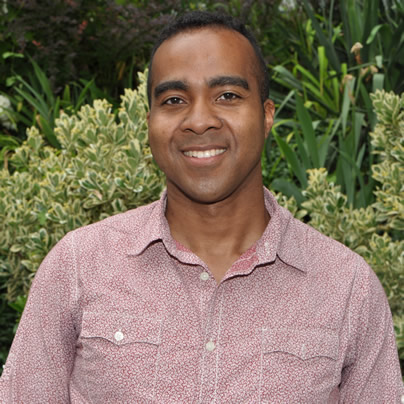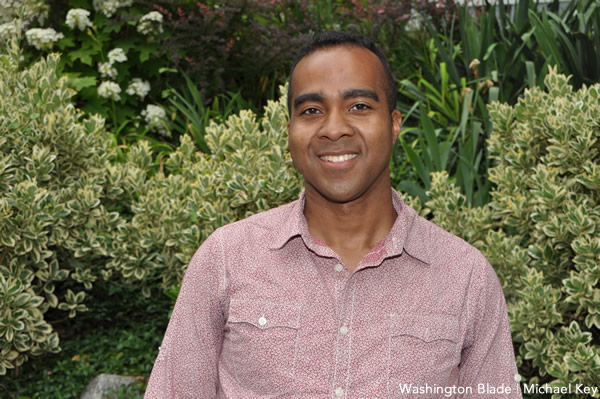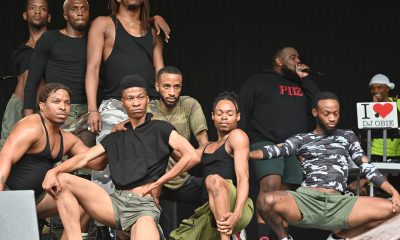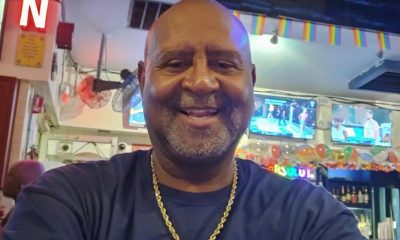Arts & Entertainment
Queery: Sterling Washington
The Federation of Black Prides manager and singer answers 20 gay questions

Sterling Washington jokes about the time he became a “professional homosexual” when he went to work for Us Helping Us.
He’d previously been a presidential appointee (he was an assistant in the Office of Administration) in the Clinton White House, he then worked in IT work for several years, went back to school at Howard to get a second degree, then landed at Us Helping Us working in development. Since July 2008, he’s been resource and grant development manager at the International Federation of Black Prides. Previously he served on the board of D.C. Black Pride.
Washington, a native Washingtonian, says the Federation does important work.
“Each of the Black Prides have advocacy projects they execute in local communities that could be anything from HIV work to youth empowerment to pushing for pro-LGBT legislation,” he says. “I think that work is very important.”
Washington is also a singer and sings tenor in the choir at the National City Christian Church in Thomas Circle. He loves opera and jazz and dreams perhaps one day of living in Vienna.
Washington grew up in the District’s Shepherd Park area and enjoys watching TV, reading, dining out with friends, acupuncture, walks in the woods and playing the piano in his free time. He’s single, though he’s recently been dating someone more regularly. (Blade photo by Michael Key)
How long have you been out and who was the hardest person to tell?
I’ve been out since 1994, when I was in undergrad at GWU. The hardest person to tell was my mother, who took the news better than I expected. Since she insisted on telling my father herself, I was spared the stress associated with telling him. Although they were a little resistant at first, both of my parents grew to accept my sexual orientation over time.
Who’s your LGBT hero?
This is difficult to answer because there are so many. Dr. Zachary Gabriel Green, a clinical psychologist and an expert on group dynamics, is definitely one of my LGBT heroes. He has done amazing work around identity-based conflicts and leadership development, publishing numerous papers on those subjects. Dr. Green and his husband, Dr. Rene Molenkamp, really helped in my coming out process and they remain good friends of mine. There’s also the late Bayard Rustin, who was an extraordinary community organizer. Like Rustin, I am an activist and singer.
What’s Washington’s best nightspot, past or present?
It’s a tie between The Andalusian Dog and “The Deep End” at Club Andalu. The former was around in the late ’90s and was located near 14th and U streets, N.W. The latter had its heyday in 2002-2004 and featured the music of DJ Mandrill, who is fantastic.
Describe your dream wedding.
My husband and I would wed in a romantic outdoor setting, followed by a lavish reception and dancing under the stars.
What non-LGBT issue are you most passionate about?
Environmental issues. In fact, I Tweet a lot more about environmental issues than LGBT issues. Environmental degradation impacts every living thing on the planet.
What historical outcome would you change?
The 2000 presidential election, which remains the most disappointing election of my life.
What’s been the most memorable pop culture moment of your lifetime?
The release of the “Star Wars” prequels, although Episode III was the only one I really enjoyed.
On what do you insist?
Understanding and respect for other people’s culture and religious beliefs.
What was your last Facebook post or Tweet?
I Tweeted a petition in support of the Community Renewables Act of 2012, which is coming before D.C. City Council.
If your life were a book, what would the title be?
“On My Journey Now” would be the title. It is inspired by one of my favorite African-American spirituals.
If science discovered a way to change sexual orientation, what would you do?
Nothing. To quote the late Frank Kameny, “Gay is good.”
What do you believe in beyond the physical world?
A loving and inclusive God and an afterlife.
What’s your advice for LGBT movement leaders?
My advice is to attend a Tavistock group relations conference. These leadership conferences use experiential learning to uncover the unconscious processes that affect how organizations operate. I’ve been to at least five of these conferences, four as a member and once as an administrator. I have learned something new about myself every time and acquired knowledge and skills that improved the effectiveness of organizations in which I served.
What would you walk across hot coals for?
Since I’m a foodie, I’d walk across hot coals for a great meal.
What LGBT stereotype annoys you most?
The assumption that LGBT people are trying to convert all heterosexuals to our sexual orientation. Sure, we’re trying to convert some of them, but not all!
What’s your favorite LGBT movie?
“Latter Days” is my favorite, although this changes often.
What’s the most overrated social custom?
Answering one’s cell phone or texting back as soon as someone calls or text messages you. It is important to have personal time. Besides, it is not appropriate to answer the phone or text everywhere.
What trophy or prize do you most covet?
I would like to receive the designation of Kammersänger by the Austrian government. It is a title given to a distinguished singer and it is rare for an American to receive it.
What do you wish you’d known at 18?
That the popular images of LGBT people in the media are not reflective of the entire community.
Why Washington?
Well, I was born here and just never left. While I do not plan to stay here forever, Washington is a nice place to live, despite my occasional frustrations with the city.

Team DC, the umbrella organization for LGBTQ-friendly sports teams and leagues in the D.C. area, held its annual Night of Champions Awards Gala on Saturday, April 20 at the Hilton National Mall. The organization gave out scholarships to area LGBTQ student athletes as well as awards to the Different Drummers, Kelly Laczko of Duplex Diner, Stacy Smith of the Edmund Burke School, Bryan Frank of Triout, JC Adams of DCG Basketball and the DC Gay Flag Football League.
(Washington Blade photos by Michael Key)




















The 2024 National Cannabis Festival was held at the Fields at RFK Stadium on April 19-20.
(Washington Blade photos by Michael Key)
















Covering the @NatlCannaFest at RFK Stadium for @WashBlade . Stop by the LGBTQ+ booth and pick up a paper if you are here. pic.twitter.com/is7hnsaPns
— Michael Patrick Key (@MichaelKeyWB) April 20, 2024
Theater
‘Amm(i)gone’ explores family, queerness, and faith
A ‘fully autobiographical’ work from out artist Adil Mansoor

‘Amm(i)gone’
Thorough May 12
Woolly Mammoth Theatre
641 D St., N.W.
$60-$70
Woollymammoth.net
“Fully and utterly autobiographical.” That’s how Adil Mansoor describes “Amm(i)gone,” his one-man work currently playing at Woolly Mammoth Theatre.
Both created and performed by out artist Mansoor, it’s his story about inviting his Pakistani mother to translate Sophocles’s Greek tragedy “Antigone” into Urdu. Throughout the journey, there’s an exploration of family, queerness, and faith,as well as references to teachings from the Quran, and audio conversations with his Muslim mother.
Mansoor, 38, grew up in the suburbs of Chicago and is now based in Pittsburgh where he’s a busy theater maker. He’s also the founding member of Pittsburgh’s Hatch Arts Collective and the former artistic director of Dreams of Hope, an LGBTQ youth arts organization.
WASHINGTON BLADE: What spurred you to create “Amm(i)gone”?
ADIL MANSOOR: I was reading a translation of “Antigone” a few years back and found myself emotionally overwhelmed. A Theban princess buries her brother knowing it will cost her, her own life. It’s about a person for whom all aspirations are in the afterlife. And what does that do to the living when all of your hopes and dreams have to be reserved for the afterlife?
I found grant funding to pay my mom to do the translation. I wanted to engage in learning. I wanted to share theater but especially this ancient tragedy. My mother appreciated the characters were struggling between loving one another and their beliefs.
BLADE: Are you more director than actor?
MANSOOR: I’m primarily a director with an MFA in directing from Carnegie Mellon. I wrote, directed, and performed in this show, and had been working on it for four years. I’ve done different versions including Zoom. Woolly’s is a new production with the same team who’ve been involved since the beginning.
I love solo performance. I’ve produced and now teach solo performance and believe in its power. And I definitely lean toward “performance” and I haven’t “acted” since I was in college. I feel good on stage. I was a tour guide and do a lot of public speaking. I enjoy the attention.
BLADE: Describe your mom.
MANSOOR: My mom is a wonderfully devout Muslim, single mother, social worker who discovered my queerness on Google. And she prays for me.
She and I are similar, the way we look at things, the way we laugh. But different too. And those are among the questions I ask in this show. Our relationship is both beautiful and complicated.
BLADE: So, you weren’t exactly hiding your sexuality?
MANSOOR: In my mid-20s, I took time to talk with friends about our being queer with relation to our careers. My sexuality is essential to the work. As the artistic director at Dreams of Hope, part of the work was to model what it means to be public. If I’m in a room with queer and trans teenagers, part of what I’m doing is modeling queer adulthood. The way they see me in the world is part of what I’m putting out there. And I want that to be expansive and full.
So much of my work involves fundraising and being a face in schools. Being out is about making safe space for queer young folks.
BLADE: Have you encountered much Islamophobia?
MANSOOR: When 9/11 happened, I was a sophomore in high school, so yes. I faced a lot then and now. I’ve been egged on the street in the last four months. I see it in the classroom. It shows up in all sorts of ways.
BLADE: What prompted you to lead your creative life in Pittsburgh?
MANSOOR: I’ve been here for 14 years. I breathe with ease in Pittsburgh. The hills and the valleys and the rust of the city do something to me. It’s beautiful, it’ affordable, and there is support for local artists. There’s a lot of opportunity.
Still, the plan was to move to New York in September of 2020 but that was cancelled. Then the pandemic showed me that I could live in Pittsburgh and still have a nationally viable career.
BLADE: What are you trying to achieve with “Amm(i)gone”?
MANSOOR: What I’m sharing in the show is so very specific but I hear people from other backgrounds say I totally see my mom in that. My partner is Catholic and we share so much in relation to this.
I hope the work is embracing the fullness of queerness and how means so many things. And I hope the show makes audiences want to call their parents or squeeze their partners.





















